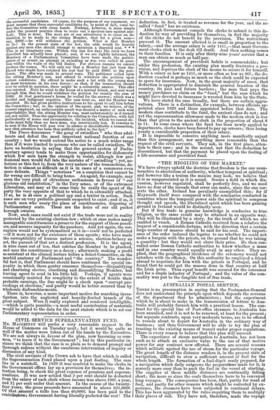"THE HIGGLING OF THE MARXET."
WE have always upheld the doctrine that freedom is the one coun- teractive to absolutism of authority, whether temporal or spiritual ; and however like a truism the maxim may look, we believe that it is as unappreciated as it is sound. Secure a field in which dis- cussion, however regulated, shall be perfectly free, and we need have no fear of the inroads that error can make, since the one cor- rects the other. Ireland has peculiarly exemplified this; for if Maynooth itself were compared with the seminaries conducted in countries where the temporal power aids the spiritual to compress thought and speech, the liberalized spirit which has been gaming ground in Ireland would be distinctly seen. But if free trade in genuine knowledge is conducive to true religion, so the same result may be attained in an opposite way. This will be illustrated by a story, for the truth of Which we are enabled to vouch. A Roman Catholic received from a relative the bequest of a considerable fortune, with the direction that a certain large number of masses should be said for his soul. The import- ance of the order induced the legatee to see whether he could not make a. bargain with the priests, on the ground that he was taking a quantity : but they would not abate their price. He then con- sulted some Roman Catholic authorities to know whether a mass said in one country would equally avail in any other. They re- plied, that the geographical incidence of the ceremony would not interfere with its efficacy. On this authority he employed a friend abroad to negotiate for him with the priests in Portugal, and he found that he could get the masses done in that country at half the Irish price. Thus equal benefit was secured for the consumer and for a staple industry of Portugal ; and the value of the com- modity was put to the tangible test of free trade.


























 Previous page
Previous page